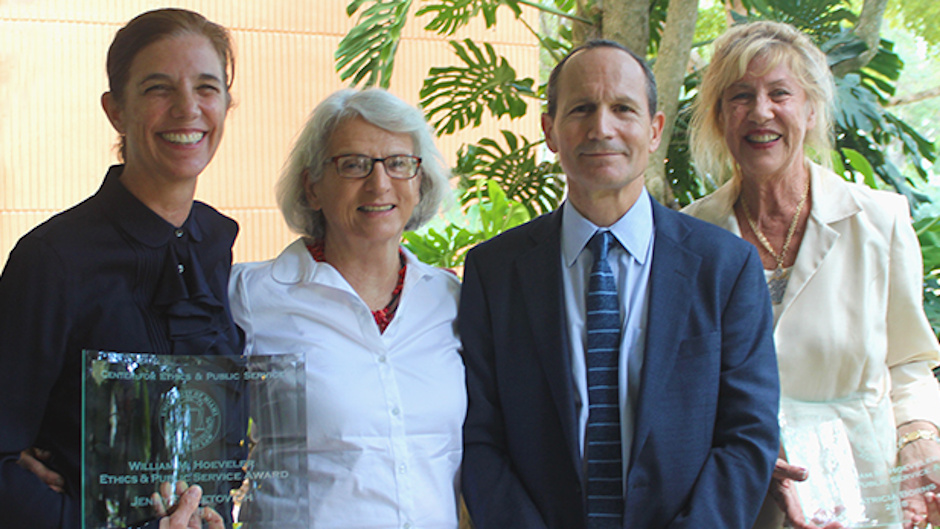Miami Law's Center for Ethics and Public Service chose to honor two environmental journalists, Patricia Borns, and Jenny Staletovich, with the 18th annual William M. Hoeveler Award. The prestigious prize celebrates extraordinary members of the bar and bench, nonprofit organizations, and individuals distinguished by their long-standing dedication to ethics and public service. To honor Borns and Staletovich, the law school recently hosted a luncheon and ceremony.
Social Justice Reporter
Borns is a social justice reporter whose work has changed lives and laws. Borns brought about the multi-million-dollar cleanup of a toxic landfill in a Fort Myers African American community sparked legislation to curb addicted healthcare workers in Virginia, and helped West Coconut Grove residents prevent the City of Miami from putting a polluting trolley depot within five feet of their homes.
Journalist with Focus on Environment
Staletovich has been a journalist working in Florida for nearly 20 years. She’s reported on some of the region’s major environment stories, including the 2018 devastating red tide and blue-green algae blooms, impacts from climate change, and Everglades restoration, the nation’s largest water restoration project. She’s also written about disappearing rare forests, invasive pythons, diseased coral, and a host of other critical issues around the state.
“The Center for Ethics and Public Service is thrilled to honor Florida prize-winning journalists’ Patricia Borns and Jenny Staletovich with the 18th Annual William M. Hoeveler Award,” said Anthony Alfieri, director of CEPS. “Throughout his distinguished career serving the Florida bar and bench, and in his civic life as well, Judge Hoeveler championed the interests of justice and the environment. Both Patricia Borns and Jenny Staletovich honor Judge’s Hoeveler’s spirit and his vision of civic leadership.”
CEPS History as an Incubator for Public Service Initiatives
Founded in 1996, the Center for Ethics and Public Service is a law school-housed experiential education, skills training, and community engagement program devoted to the values of ethical judgment, professional responsibility, and public service in law and society. The Center’s mission is to educate law students to serve their communities as citizen lawyers.
For 24 years, the Center has served as an incubator and an accelerator for numerous public service projects at the law school. The projects include clinics: Children and Youth Law Clinic, Community Lawyering Clinic, Health Law Clinic, Social Enterprise Clinic, and Environmental Justice Clinic; programs including the Dartmouth College Ethics Institute Internship Program, Professional Responsibility and Ethics Program, Street Law Program, and Joint College of Arts & Sciences Program on Law, Public Policy, and Ethics, UM Environmental Justice, Policy, & Science Consortium summer colloquia, and the documentary films in the Oral History & Documentary Film Project.
The Hoeveler Award was created in honor of the Honorable William M. Hoeveler, senior U.S. District Court judge and the inaugural recipient, as a lifetime achievement award for a lawyer or an organization of outstanding ethics and public service.
Past awardees include former U.S. Attorney General Janet Reno, former Florida Supreme Court Chief Judge Rosemary Barkett, and Miami-Dade State Attorney Katherine Fernández Rundle, who has served since 1993.
“This is a very special award for me because I developed my sense of social justice as a University of Miami journalism graduate student working with the law school’s Center for Ethics and Public Service and residents in the West Grove,” said Borns. “Now, here I am today, a journalist breaking a story that has resulted in the clean-up of a half-century-old toxic landfill in an African American community with the Environmental Justice Clinic at the community’s side pressing a class action lawsuit on its behalf. My work stands on the shoulders of these socially conscious law school programs.”
"As an environmental reporter in Florida, it is an absolute honor to receive an award in the name of Judge Hoeveler,” said Staletovich. “Hoeveler understood the state's environmental problems as well as anyone as he unraveled the complicated law surrounding the clean-up of the Everglades and weighed the consequences society would pay without action. We should all aspire to his sense of fairness, tenacity, and compassion."
More on the Center for Ethics and Public Service
More on Public Interest at Miami Law

